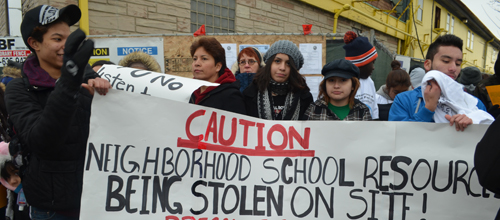GOP hopeful Bruce Rauner’s Noble Street charter network scores $400,000 at the expense of low-income, minority children

CHICAGO—As the Chicago Teachers Union (CTU) pushes for reform in Illinois charter school law and increased accountability to the public from charter networks, there is increasing concern among parents and fair education advocates over disciplinary policies at some of the privately held, publicly funded schools. The Noble Network of Charter Schools, supported financially by millions of dollars in donations from billionaire gubernatorial candidate Bruce Rauner, has garnered much attention for its use of fines to encourage better behavior.
Noble has raised almost $400,000 in disciplinary fees since the 2008-09 school year, according to data received from Freedom of Information Act requests by the parent group Parents United for Responsible Education (PURE), and Chicago Public Schools (CPS) included the charter network in its own research on how charter schools expel students at a vastly higher rate than the rest of the district. At Noble campuses, anywhere from 2 percent to nearly 5 percent of students were expelled in the last school year. The district average for expulsions last year is just over 0.05 percent.
“It’s very clear that Noble Street’s ‘secret sauce’ is no real secret,” said CTU President Karen Lewis. “Under Bruce Rauner’s leadership our students are commodified and their teachers are incentivized to punish children and collect fines. It is also ironic that while charters are in Springfield demanding more money and less accountability that the billionaire boys club –Rauner, Ken Griffin, Lester Crown and others—continues to pour money into these failed reform models.”
Rauner, infamous for his pro-charter school stance, despite sending one of his daughters to a high-performing Chicago public high school with union teachers, has given about $2.5 million to the Noble network and its nearly 9,000 students, 98 percent of whom are African American and Latino/a and 89 percent who come from low-income families. His family foundation has also given about $4 million to other organizations that operate or support charter schools.
While the amount in disciplinary fines collected by Noble is considerably less than the contributions made by Rauner, one of its largest benefactors, it is a serious concern when a school consistently hailed by the mayor of Chicago for its innovation and academic success lacks a progressive stance on discipline. Hundreds of thousands of dollars may be small change to the gubernatorial hopeful, but it’s a lot of money to the minority and low-income families of the city. The suspension and expulsion data shows that charters are much more punitive than neighborhood schools and CPS wants to work with the charters on a remedy, but cannot due to the inherent autonomy in their governance structure.
“Rauner doesn’t care about our children” Lewis said. “He is a ‘twenty-five percenter’—someone who believes that 25 percent of our students don’t deserve access to a high quality education. He and his charter allies are only looking to help children who are compliant and help them promote the false narrative that charter operations fair better than neighborhood schools—something that is patently untrue.”
When billionaires like Bruce Rauner fund charters and receive tax reductions from the donations, the school district loses money that it would have been able to spend on things like more social workers to help improve the disciplinary problems at the schools. The public school tax evasion from billionaires creates budgetary problems that prevent schools from implementing positive programs to help students succeed, and money directly to private charters makes them appear more attractive and safer.
Parents from low-income families who want their children to become their family’s first-generation college graduates are led to believe that the only way to attend college is to be subjugated to paternalistic, draconian rules and pay hefty fines. This, however, is false. Only about 69 percent of Noble freshmen graduate from the network in four years, so their college enrollment rates, which are calculated on the number of students graduating, are grossly inflated.
“Excessively fining our children is not the way to improve their behavior,” Lewis said. “You help them much more effectively by improving the social and wraparound services offered in their schools and communities, giving them structure and giving their families the resources they need to succeed.”
